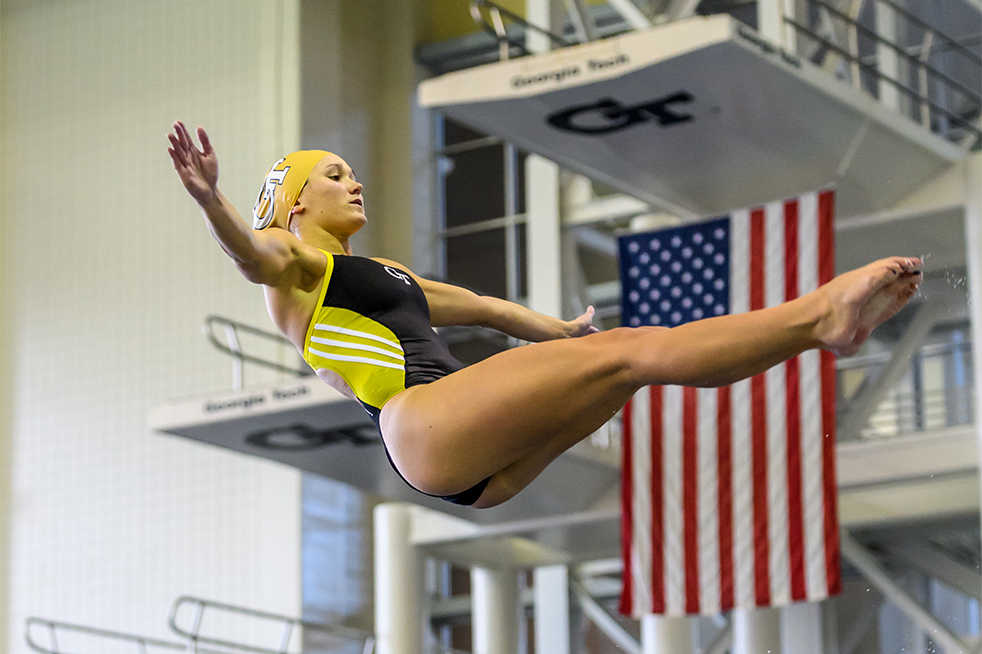Andrea Demick is a fourth-year BA and co-captain of the diving team. The Atlanta native has been diving since third grade and recently set a personal best in the 3-meter dive. Demick shares her story of balance and how the Total Person Program has helped her succeed.
Technique: Being a senior, diving, being co-captain, how do you specifically balance that?
Demick: Personally, for me it’s all about time management. I like to think I’m a very organized person, and I don’t think I would be able to balance it all if I wasn’t. I have three calendars, todo lists, all that kind of stuff. But honestly, I feel like it’s making priorities and sticking to what’s important for me, like a list of priorities and how I want to get things done.
Technique: What do you do in your free time, if you have free time?
Demick: Free time is pretty much on the weekends. It’s up to the individual when they want to decide they have free time. I leave my room at 6 in the morning; I get back around 7–8 at night. If you have an hour between classes, you can’t use it to take a nap or do video games; you have to prioritize. I personally have decided that my free time is going to be Friday and Saturday. Sunday, I catch up or get ahead on work so that I’m not stressed all week.
In my free time, the team all hangs out. We all watch movies together and go to dinner and stuff. It’s kinda nice that we hang out together outside of practice and pool so that inside practice we can support each other and know what each other is going through.
Technique: We’re trying to highlight some of the misconceptions people have about student-athletes. Do you have any experience with that?
Demick: I have had a little bit of experience, yeah, mostly revolving around group projects and meeting times outside of class. Our presence in the classroom is not the problem; it’s our availability outside the classroom just because we do have practices and workouts and stuff like that. That’s where I feel the biggest misconception is. Then again, that varies sport by sport.
Technique: How has the Total Person Program helped you?
Demick: It proves that the Athletic Association and the school as a whole care more about just us being athletes. It proves they care about us as individuals after Georgia Tech and when we graduate. Our talks are anywhere from how to handle finances to how to be a better leader, stuff like that. It prepares us for our future. I definitely think the opportunities I’ve had to be a leader in the Total Person Program have helped me be a leader in the team and be a leader in classrooms. Skills like that, through experience and listening to how other people have handled their situations.
Technique: How have they helped you specifically with leadership?
Demick: Well, I’m on the student-athlete advisory board. It’s a group of maybe 30–40 athletes. We plan events for the entire athletic department, and I’m the secretary on that. Through formal positions and also through opportunities, like we are so involved in community service and just reaching out to the community — Girls on the Run, Special Olympics, stuff like that. Being able to have that other outlet and realizing that there is more important stuff than just athletics, through small things. Community service and stuff like that.
Technique: Some non-athletes say that athletes aren’t able to experience what Tech has to offer. Do you feel like you’re experiencing Tech?
Demick: I think we experience it in a different way. I wouldn’t change the way I’m experiencing it at all, if I could go back and do it again. Sometimes our time is very taken up by athletics, so we can’t join sororities and fraternities just because there’s not the time. Same as other students, we choose where we put our time. Those students chose to put it whether it’s in Greek life or other clubs or organizations. We chose to put it in athletics, and that’s what’s important to us. We’re not hindered in other ways. We’re allowed to take what majors we want. We’re allowed to take what classes we want, stuff like that. Sometimes it doesn’t work out with practice times, but that’s the same for any student.
So no, I don’t really think that way. I think the athletic department does a great job of giving us as many opportunities as they can, and they’re trying to promote us getting more involved with the full student body as well.
Technique: What are your plans for after graduation?
Demick: I am going to law school.
Technique: Nice. GTAA also has a program to help with the GRE, LSAT, etc. How has that helped you?
Demick: I took the LSAT once before using that study tool and once after. Having that option and knowing they do want us to succeed post-graduation … they were so helpful in making sure I could get involved and get some studying for the LSAT. I think it’s something that’s great that they are doing. I know some of my teammates also used it for the GRE and stuff like that. It’s the same program that everyone [else] has access to, but they make it known that we can use it.
